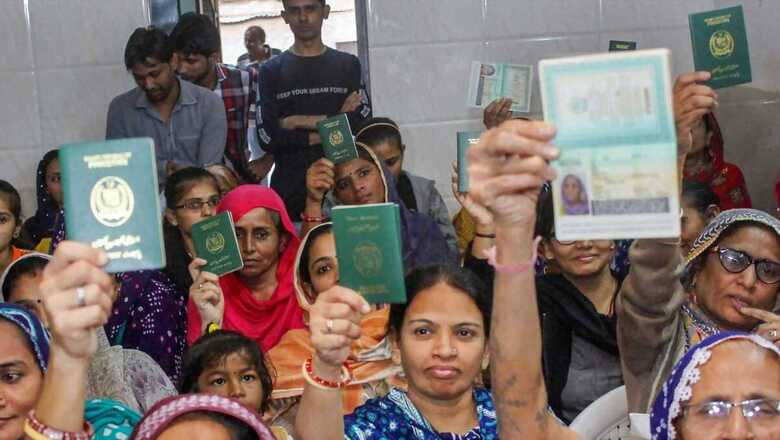
views
The concept of ‘Nation first’ in a manifesto was initially introduced by the founding father of Bharatiya Jana Sangh, Dr Syama Prasad Mookerjee. This concept was prioritised and later carried forward by the Bharatiya Janata Party (BJP) in most of its manifestos since its founding. In its party manifesto released in 2019, the BJP reaffirmed its commitment to ‘Nation first’ by including the implementation of the Citizenship Amendment Act (CAA). This commitment encompassed a range of reforms aimed at safeguarding the interests of our nation and its citizens, ensuring safety and security.
These reforms included a strong stance against terrorism, prioritising the welfare of our soldiers, bolstering both internal and external security, strengthening coastal security, revoking Article 370, combating left-wing extremism, and implementing the CAA. The inclusion of the CAA within the ‘Nation first’ section of the party manifesto highlights its significance in ensuring the safety and security of our country.
Nevertheless, since the enactment of the law in 2019, numerous misleading narratives have emerged regarding its implementation. Prominent Opposition parties argued that excluding Muslims from the scope of the law contradicted the principles of the Constitution, specifically the right to equality guaranteed by it. Several state governments, including those in Kerala and Tamil Nadu, openly opposed this law, leading to widespread protests in these regions. Additionally, a particular segment of the media in these states aligned themselves with the protests, disregarding the actual purpose of the law and its significance in ensuring the security of our nation.
Indian Muslims must comprehend that the CAA is designed not to target their community, but rather to establish a legal framework for aiding persecuted religious minorities. Islam, as a faith, underscores the significance of remaining loyal to both God and one’s nation. The Prophet proclaimed, “Love for one’s nation is a part of faith.” This principle illustrates that a Muslim’s love for God and dedication to his nation are not contradictory ideas, but rather harmonious expressions of his faith. Islam urges Muslims to actively contribute to fostering peace and working towards societal improvement. Genuine love for God and Islam also involves demonstrating loyalty, respect, and devotion to one’s country. Nevertheless, certain malicious factions of society are currently spreading misinformation that this law is discriminatory against the Muslim community.
India has consistently championed the rights of minority groups worldwide. Unlike our neighbouring country, we have diligently upheld the Nehru-Liaquat pact, and our Hindu brethren have always safeguarded minority communities. Throughout history, India has provided sanctuary to persecuted minorities, such as Jews and Parsis, who have embraced our nation as their home. The legislation in question is specifically designed to offer protection to religious minorities who face severe persecution in their home countries. As a Hindu-majority nation, India stands as a beacon of hope for these vulnerable communities, providing them with refuge and a pathway to Indian citizenship.
The government’s stand that the Citizenship Amendment Act (CAA) is a targeted response to the specific persecution faced by religious minorities in select neighbouring countries reinforces our commitment to protect the persecuted minorities. It has been carefully crafted within the legislative framework to address a well-defined humanitarian crisis. The exclusion of Muslims in the Act is not an attempt to exclude them from Indian society, but rather a recognition that Muslims constitute the majority in these neighbouring nations and therefore do not face the same level of persecution as religious minorities. Additionally, Muslims have alternative pathways to citizenship, including naturalisation available to them if they meet the prescribed criteria.
By offering a legitimate means for individuals to seek refuge, the CAA has the potential to address a complex issue. It is for this reason that the act was included in the BJP manifesto of 2019 under the principle of ‘Nation first’.
There is a group of individuals who are raising concerns about the government’s decision to not allow Rohingyas from Myanmar to settle in India. By examining the situation in Pakistan, doubts can be clarified. Presently, there are 55,000 Rohingyas officially residing in Pakistan, with many located in the Arkanabad neighbourhood of Karachi. Although the actual number of Rohingya families may be as high as 300,000, a significant portion of them migrated to Karachi following the rise of a repressive military regime in Burma in 1962. Despite spending half a century in Pakistan, the Rohingya community in Karachi still faces challenges in obtaining citizenship. Those who arrived after the civil war in 1971 are unable to acquire national identification cards, which prevents them from enrolling their children in public schools, accessing government health facilities, or even opening bank accounts. This situation arises due to the fact that countries like India, Pakistan, and Bangladesh have large populations and limited resources.
Adding a substantial number of refugees to the population would further strain the available resources, leading to a decline in the living standards of the citizens. Thus, India cannot accept Rohingya Muslims into its borders nor grant citizenship to such a large number of people. The question of Rohingya prosecution is to be settled under International Law since their influx not only affects India but entire South Asia as well. Their citizenship and rehabilitation has to be discussed under a wider context of International laws.
Protests erupted in states like Assam immediately after the notification of the CAA rules. It is crucial to dispel the misconception that the CAA undermines the Assam Accord, a pact signed in 1985 to tackle the issue of illegal immigration in Assam. Some argue that the CAA goes against the accord by potentially granting citizenship to those who entered Assam unlawfully. Nevertheless, the CAA contains safeguards to protect the interests of Assam and other Northeastern states. It empowers the government to designate regions and communities that will be excluded from its provisions, ensuring that local demographics are not negatively impacted.
In India, minorities are recognised as equal partners in the development process, emphasising the importance of diverse cultures and religions, as well as promoting tolerance and acceptance among all communities. The CAA’s emphasis on offering refuge to persecuted minorities does not diminish the rights and privileges enjoyed by Indian Muslims. Instead, it highlights India’s dedication to humanitarian values and the preservation of secular principles by providing assistance to vulnerable communities regardless of their faith.
A thorough understanding of CAA’s provisions is essential to grasp its impact on India’s varied religious landscape, and the Opposition must avoid exploiting this issue for political gains by inciting minorities before elections.
Adarsh Kuniyillam is a Parliamentary, Policy and Political analyst and tweets at @authoradarsh. Views expressed in the above piece are personal and solely those of the author. They do not necessarily reflect News18’s views.

















Comments
0 comment